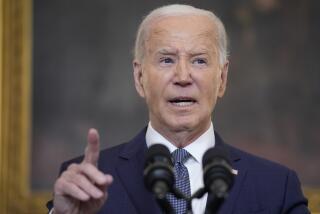MIDEAST: U.S. Sets Conditions for Soviet Role : U.S. Lists Tough Conditions for Soviets in Mideast Talks
- Share via
WASHINGTON — The Reagan Administration is prepared to move Mideast peace negotiations into some kind of “international context” but is determined to exclude the Soviet Union from the talks unless Moscow makes profound changes in its policy toward Israel and the Arab world, the State Department said Thursday.
Spokesman Edward P. Djerejian spelled out conditions for Soviet participation that seemed so tough that Moscow surely would reject them--throwing a new roadblock into the path of the international conference that King Hussein of Jordan advocates as an “umbrella” for negotiations with Israel.
Nevertheless, Djerejian described as progress Hussein’s statement Wednesday that he and the Palestine Liberation Organization are ready for direct talks with Israel, provided that the Israelis agree to participate in a conference with Arab governments and the five permanent members of the U.N. Security Council--the United States, Soviet Union, Britain, France and China.
“This is a process, and one in which progress is going to be incremental,” Djerejian said. “There is a lot that is positive in the outcome of these meetings (between Hussein and Administration officials), and which offer us much to build upon.”
Hussein has been calling for an international conference for the last two years, but his claim that he enjoys the full support of the PLO is new. Although the United States repeatedly has rejected Hussein’s conference plan in the past, President Reagan said Wednesday that the idea is “under discussion.”
Reagan’s softening of previous U.S. opposition to the conference proposal caused a furor in Israel, where the government wants direct negotiations with Jordan but rejects the idea of an international conference and flatly refuses to consider negotiating with the PLO.
Prime Minister Shimon Peres, talking to reporters in the north coastal town of Acre, said, “I think the whole issue of an international conference is an attempt to sidestep the need for direct negotiations.” He called on the United States to stand firm in its opposition to such a conference.
A source in the U.S. Jewish community said State Department officials telephoned leaders of Jewish organizations Wednesday night to assure them that the United States has not softened its support for Israel.
‘International Context’
In a toast at a dinner in Hussein’s honor Wednesday night, Secretary of State George P. Shultz praised the Jordanian monarch for affirming his support for negotiations between Israel and a joint Jordanian-Palestinian delegation “in a supportive international context.”
“We will continue to work on resolving our differences on how best to provide that context,” Shultz said.
The word “context” was not further defined. Although it could include an international conference, it clearly was intended to imply something less than that. Nevertheless, Shultz’s words fell short of the previous U.S. insistence on direct negotiations between Israel and its Arab neighbors without intermediaries.
At his regular daily briefing, Djerejian emphasized the U.S. distaste for a Soviet role in the Mideast.
“We have said on many occasions that if the Soviet Union demonstrated a willingness to play a constructive role in the Middle East peace process, we would welcome that development,” he said. “So far, we have seen no evidence that the Soviets are prepared to play such a role.”
Demands on Soviets
Asked what the Soviets would have to do to win Washington’s stamp of approval, Djerejian said: “Constructive behavior includes such things as resumption of full diplomatic relations with Israel; the ending of Soviet anti-Semitic propaganda; the improved treatment of Soviet Jews, including the right to emigrate; the exercise of Soviet influence to reduce arms supplies to Iran; ending Soviet arms supplies to militia groups in Lebanon; desisting from efforts to obstruct positive moves toward expanding the peace process in the region.”
Hussein met again with Shultz and other State Department officials Thursday after a breakfast session with 12 members of Congress. Rep. Stephen J. Solarz (D-N.Y.) said Hussein stressed in his meeting with the lawmakers that Jordan needs U.S. arms to defend against a military threat from its Arab rival, Syria. However, the monarch received no public support from the congressmen for his request.
“It’s self-evident that Jordan is extremely vulnerable,” said Solarz, a strong backer of Israel. “The problem is that arms that can be used against the Syrians can also be used against Israel.”
Nathan Perlmutter, executive director of the Anti-Defamation League of B’nai B’rith, complained that Hussein’s objective is to obtain arms.
“The real negotiations were the king’s negotiations for arms sales,” Perlmutter said. In a reference to the envoy in Longfellow’s “Courtship of Miles Standish,” he asked: “If (PLO leader Yasser) Arafat wants to negotiate, why a John Alden? If Hussein wants to negotiate, why the cover of an international conference? They both have Peres’ address.”
More to Read
Sign up for Essential California
The most important California stories and recommendations in your inbox every morning.
You may occasionally receive promotional content from the Los Angeles Times.













